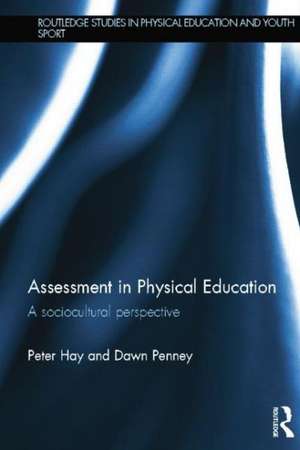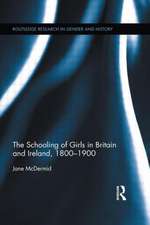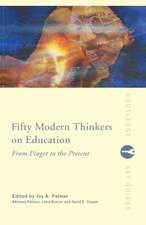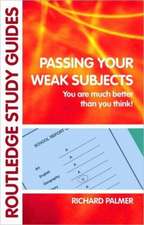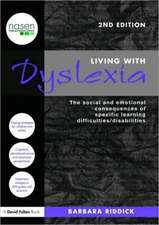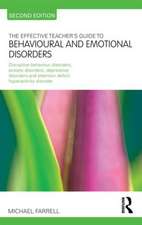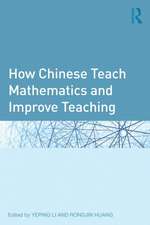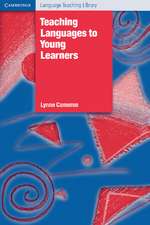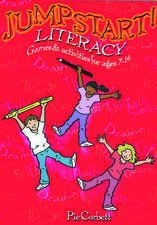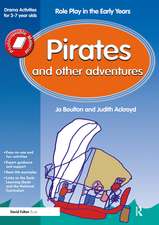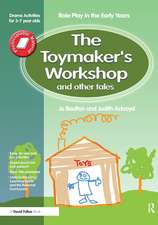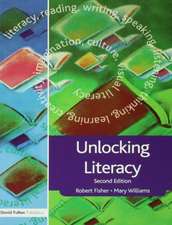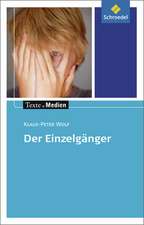Assessment in Physical Education: A Sociocultural Perspective: Routledge Studies in Physical Education and Youth Sport
Autor Peter Hay, Dawn Penneyen Limba Engleză Paperback – 17 iul 2014
Divided into three parts, Assessment in Physical Education makes an important contribution to our understanding of the socio-cultural issues associated with assessment in physical education, in terms of its systemic development as well as at the level of pedagogic relations between physical education teachers and their students. It provides readers with an insightful critique and theoretically informed ideas for rethinking assessment policies and practices in physical education.
This book will be of interest to advanced students and researchers in physical education and youth sport studies, as well as those involved in initial teacher education and teacher professional development.
| Toate formatele și edițiile | Preț | Express |
|---|---|---|
| Paperback (1) | 455.52 lei 43-57 zile | |
| Taylor & Francis – 17 iul 2014 | 455.52 lei 43-57 zile | |
| Hardback (1) | 1053.01 lei 43-57 zile | |
| Taylor & Francis – 31 aug 2012 | 1053.01 lei 43-57 zile |
Din seria Routledge Studies in Physical Education and Youth Sport
-
 Preț: 317.91 lei
Preț: 317.91 lei -
 Preț: 308.50 lei
Preț: 308.50 lei -
 Preț: 310.45 lei
Preț: 310.45 lei -
 Preț: 402.03 lei
Preț: 402.03 lei - 8%
 Preț: 397.56 lei
Preț: 397.56 lei - 5%
 Preț: 314.04 lei
Preț: 314.04 lei - 8%
 Preț: 381.99 lei
Preț: 381.99 lei -
 Preț: 664.74 lei
Preț: 664.74 lei -
 Preț: 311.41 lei
Preț: 311.41 lei - 18%
 Preț: 1114.40 lei
Preț: 1114.40 lei -
 Preț: 468.03 lei
Preț: 468.03 lei - 14%
 Preț: 325.34 lei
Preț: 325.34 lei -
 Preț: 406.81 lei
Preț: 406.81 lei - 18%
 Preț: 1112.21 lei
Preț: 1112.21 lei -
 Preț: 406.34 lei
Preț: 406.34 lei -
 Preț: 482.53 lei
Preț: 482.53 lei - 18%
 Preț: 1059.48 lei
Preț: 1059.48 lei -
 Preț: 296.15 lei
Preț: 296.15 lei -
 Preț: 488.71 lei
Preț: 488.71 lei - 18%
 Preț: 1000.27 lei
Preț: 1000.27 lei -
 Preț: 392.50 lei
Preț: 392.50 lei -
 Preț: 491.17 lei
Preț: 491.17 lei -
 Preț: 414.32 lei
Preț: 414.32 lei -
 Preț: 340.80 lei
Preț: 340.80 lei - 18%
 Preț: 1058.43 lei
Preț: 1058.43 lei -
 Preț: 410.46 lei
Preț: 410.46 lei -
 Preț: 361.54 lei
Preț: 361.54 lei - 26%
 Preț: 764.45 lei
Preț: 764.45 lei -
 Preț: 316.50 lei
Preț: 316.50 lei - 26%
 Preț: 763.78 lei
Preț: 763.78 lei - 18%
 Preț: 1052.38 lei
Preț: 1052.38 lei - 26%
 Preț: 822.54 lei
Preț: 822.54 lei - 15%
 Preț: 469.09 lei
Preț: 469.09 lei -
 Preț: 394.39 lei
Preț: 394.39 lei
Preț: 455.52 lei
Preț vechi: 535.91 lei
-15% Nou
Puncte Express: 683
Preț estimativ în valută:
87.18€ • 90.68$ • 71.97£
87.18€ • 90.68$ • 71.97£
Carte tipărită la comandă
Livrare economică 14-28 aprilie
Preluare comenzi: 021 569.72.76
Specificații
ISBN-13: 9781138795754
ISBN-10: 1138795755
Pagini: 160
Dimensiuni: 156 x 234 x 10 mm
Greutate: 0.3 kg
Ediția:1
Editura: Taylor & Francis
Colecția Routledge
Seria Routledge Studies in Physical Education and Youth Sport
Locul publicării:Oxford, United Kingdom
ISBN-10: 1138795755
Pagini: 160
Dimensiuni: 156 x 234 x 10 mm
Greutate: 0.3 kg
Ediția:1
Editura: Taylor & Francis
Colecția Routledge
Seria Routledge Studies in Physical Education and Youth Sport
Locul publicării:Oxford, United Kingdom
Public țintă
Postgraduate and UndergraduateCuprins
Chapter 1. Introduction Part 1: Developing Assessment ‘Messages’ in Physical Education Chapter 2. Producing Assessment Messages Chapter 3. Definitions, Differentiations and Communications of Assessment Part 2: Enacting Assessment in Physical Education Chapter 4. Defining, Acquiring and Transacting Ability Through Assessment in Physical Education Chapter 5. A Sociocultural View of Assessment Validity in Physical Education Chapter 6. Assessment Literacy in Physical Education Part 3: Promoting Assessment Efficacy in PE Chapter 7. Aligning Curriculum, Pedagogy and Assessment in Physical Education Chapter 8. Reconceptualising Assessment for Learning in Physical Education Chapter 9. Assessment Innovations, Transformations and Technologies Chapter 10. Conclusion
Notă biografică
Peter Hay is a Senior Lecturer in the School of Human Movement Studies, The University of Queensland, Australia. His work has focused on assessment practices and policies in and beyond the field of physical education and the social construction of abilities in institutional education settings.
Dawn Penney is Professor of Physical Education and Sport Pedagogy in the Department of Sport and Leisure Studies in the Faculty of Education at the University of Waikato, New Zealand. Dawn is recognised internationally for her work in policy and curriculum development in Health and Physical Education.
Dawn Penney is Professor of Physical Education and Sport Pedagogy in the Department of Sport and Leisure Studies in the Faculty of Education at the University of Waikato, New Zealand. Dawn is recognised internationally for her work in policy and curriculum development in Health and Physical Education.
Recenzii
"In order to obtain quality PE it is essential to be conscious about the role of assessment and this book offers its readers a very useful platform for discussing and elaborating assessment as a pedagogical tool. I strongly recommend the book." – Claes Annerstedt, iddrottsforum.org, Nordic Sport Science Forum
Descriere
Divided into three parts, Assessment in Physical Education makes an important contribution to our understanding of the socio-cultural issues associated with assessment in physical education, in terms of its systemic development as well as at the level of pedagogic relations between physical education teachers and their students. It provides readers with an insightful critique and theoretically informed ideas for rethinking assessment policies and practices in physical education.
